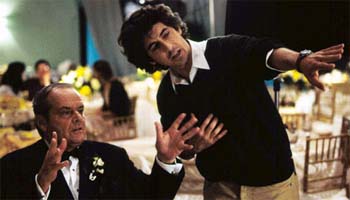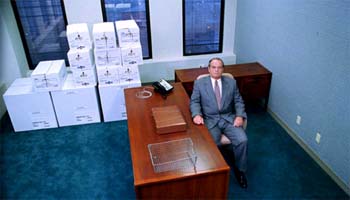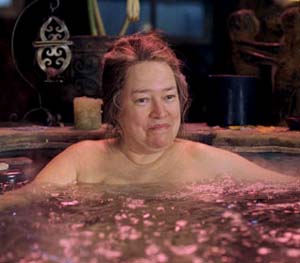
|
"Abe Lincoln?" asks a mobile-home acquaintance. "Who's that?" jokes Warren Schmidt (Jack Nicholson). He's very proud of his cleverness, oblivious to the political connotations of his joke.
Schmidt retires from the insurance business at the beginning of the film. At his retirement party, a colleague and friend offers this convoluted toast: "What really means something is the knowledge that you devoted your life to something meaningful." Schmidt will spend the rest of the movie trying to unravel the "means-something" and "something-meaningful" of his life. As the friend concludes his toast, Payne's camera remains unrelenting on Nicholson's desperately searching face: "Take a good look at a very rich man."
Payne and Taylor convey the disappointments, and attempts to cope with those disappointments, of a commonplace silent-majority Republican. It takes guts and talent to use an unorthodox, maybe even unappealing, subject like Schmidt to tell a larger story about American life. It turns out to be a necessary artistic decision. Payne and Taylor challenge the audience to reflect on the culture it shares with Schmidt. Needing "something meaningful" in his life, Schmidt writes letters to a boy he sponsors in Africa. In one letter - his own American narrative - he indulges in a fantasy about how his life might have been had he realized his All-American dream of success and acclaim in business. Payne visualizes this fantasy with mock Fortune magazine covers featuring Schmidt. Aren't magazine covers, after all, one of the ways that history gets written, that values are set? Schmidt attempts to understand his relationship to American values. But what's deeply funny about About Schmidt is how little Schmidt's reality - and his real pain - gets addressed by the very history and history-making he turns to for that elusive silver lining. During his mobile-home trip after attending - and failing to stop - his daughter's wedding to a long-haired salesman, Schmidt visits a wax museum erected in honor of the pioneers who settled the West. Payne frames a shot so that Schmidt disappears into the fake setting. "Only the strong survive," reads (warns?) a placard. On his way to the wedding, Schmidt talks to a Native American and he realizes: "They got a raw deal." As if to comfort himself, he repeats: "A raw deal." During Schmidt's roadtrip, Payne subtly creates visual humor out of hallowed wide country expanse and small-city congestion. Vertical rhymes in wide horizontal compositions, edits to different angles of both business buildings and country crossroads turn an inquiring eye on Americana. In one shot, a bug goes "splat" against the movie-screen-shaped windshield of Schmidt's mobile home. Here's bug in your eye! Payne and Taylor subvert American icons.
As a performer, Nicholson can't rely on the explosive virility he used to express masculine pain in the Nixon-era 1970s: Five Easy Pieces, Chinatown, One Flew Over the Cuckoo's Nest, and The Last Detail. Through Nicholson, the defeats Schmidt suffers become extra-funny - and extra-intimate. Once the abandoned son, Nicholson now plays the defeated father. With that irony, Payne and Taylor make a movie about some guy named Schmidt into a movie about the audience's relationship to Nicholson. At the end, Nicholson sheds Schmidt's tears for him. |
|
 Jack Nicholson and director Alexander Payne on the set of About Schmidt
Jack Nicholson and director Alexander Payne on the set of About Schmidt Schmidt retires from a life in insurance
Schmidt retires from a life in insurance  Kathy Bates in About Schmidt
Kathy Bates in About Schmidt